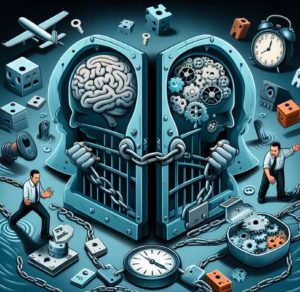Introduction
Escape rooms have taken the world by storm, captivating the imaginations of puzzle enthusiasts and adventure seekers alike. These immersive experiences offer participants the opportunity to solve a series of puzzles and riddles to “escape” from a locked room within a set time limit. While they provide a thrilling and enjoyable activity, escape rooms also delve deep into the human psyche, tapping into various aspects of psychology. In this blog, we’ll explore the fascinating world of escape room puzzles and the psychology behind solving them.

The Desire for Challenge
One of the key psychological aspects of escape rooms is the human desire for challenges. People are naturally drawn to activities that engage their intellect, and escape rooms provide the perfect platform for this. The puzzles range from simple to highly complex, catering to participants of all skill levels. This variety allows individuals to find puzzles that are both intriguing and manageable, fostering a sense of accomplishment when solved.
The Thrill of Problem Solving
Solving puzzles triggers a sense of accomplishment and a rush of dopamine in the brain. This chemical response is what makes puzzle-solving in escape rooms so addictive. Participants experience the thrill of solving a mystery and progressing toward their ultimate goal, whether it’s escaping from a “prison cell” or discovering a hidden treasure. The brain’s reward system is on full display in the satisfaction that comes from successfully cracking a puzzle.
Teamwork and Communication
Escape rooms are not only about individual problem-solving but also about teamwork and communication. These activities promote effective collaboration among participants, bringing people together to pool their knowledge and skills. Group dynamics play a significant role in the success of escape room experiences, and the psychology of teamwork is a fascinating aspect to explore.
Handling Pressure and Stress
Time pressure is another psychological element that escape rooms introduce. The countdown clock creates a sense of urgency and adds an element of stress to the puzzle-solving process. Participants must learn to manage this stress, think clearly under pressure, and stay focused on the task at hand. The ability to handle stress and maintain composure is a valuable life skill that escape rooms can help develop.
Learning Through Failure
Failure is a natural part of any escape room experience. Not every puzzle will be solved on the first try, and this provides a valuable lesson in resilience. Participants learn to adapt, iterate, and apply new strategies when they encounter challenges. Overcoming failure fosters a growth mindset, encouraging individuals to view setbacks as opportunities for improvement.
 Conclusion
Conclusion
Escape rooms are not just entertainment; they are a journey into the human psyche. They offer a unique blend of challenge, problem-solving, teamwork, and stress management, all of which contribute to a rich and immersive experience. Whether you’re an avid escape room enthusiast or new to the world of puzzles, the psychology behind solving these intricate challenges is a captivating aspect worth exploring. So, the next time you step into an escape room, remember that it’s not just about escaping a locked room—it’s a fascinating exploration of your own cognitive abilities and the power of teamwork.
“Click below to unlock the mysteries of your mind here at Clue Avenue: Where every challenge is an adventure in self-discovery.”

